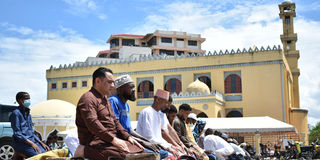Lamu residents fault county over biting water shortage during Ramadhan

Muslims pray in Mombasa, during the second Friday of Ramadhan. Lamu residents are pushing the county government to urgently address an ongoing water shortage that has hindered crucial activities during the holy month of Ramadhan.
The Muslim faithful in Lamu Island are pushing the county government to urgently address an ongoing water shortage that has hindered crucial activities during the holy month of Ramadhan.
Water is essential to Muslims, especially during the evening after breaking the fast.
However, many households within Lamu Island have witnessed rampant water shortage with some missing the commodity for over ten days in a row.
Areas hardest hit by the acute water shortage include Bombay, Kashmir, Kandahar, India, Gadeni, Bajuri, Langoni, Mkomani and Wiyoni.
Residents have been forced to rely on open wells and boreholes to source water, which is not safe for use.
Raya Famau, a resident of Bombay called on the Lamu Water and Sewerage Company (Lawasco) to explain the water shortage.
“Water is essential, especially in the evenings after a whole day of fasting. We are unhappy facing acute water shortage during this period of Ramadhan. I have witnessed dry taps in my house for the last ten days. We need an explanation, and a permanent solution on this,” said Ms Famau.
Mohamed Sharif, a cleric said there is a need for a consistent water supply in houses and mosques during Ramadhan.
“Water from most open wells and boreholes are salty and dirty. We need fresh water in mosques and our houses during this period of Ramadhan,” said Mr Sharif.
The situation is similar at Hindi-Magogoni, Kwasasi, Milimani, Basuba, Mararani, Mokowe, Siyu and Witu villages.
Residents are now at a loss as most wells and boreholes that they depend on dried up with some turning saline, making it unusable.
At Hindi-Magogoni village, more than 200 families are using a single well to source water.
Arafa Lacho, a Nyumba Kumi official said it has become difficult for the residents to observe Covid-19 protocols, particularly washing hands due to the water shortage hitting the area now.
Ms Lacho appealed to the county government of Lamu and well-wishers to supply water through water bowsers to the villages to save lives.
“The single open well we have in this village is barely enough to cater to the 200 households in need of water here. We don’t even observe Covid-19 protocols here since we don’t have the basics, particularly water to wash hands,” said Ms Lacho.
To avoid the abnormal long queues, residents, especially women and children are sometimes forced to camp at the well throughout the night just to get a can of water.
At the neighbouring Kwasasi Village, residents are forced to hire motorbikes to transport water all the way from Hindi Town, which is tens of kilometres away.
A 20-litre jerrican of water is being sold for as high as Sh50.
“You buy a jerrican of water at Sh50 and you are required to pay another Sh200 for the motorbike ferrying the water to your home. This is expensive for us. We are poor,” said Mr Ali Keah.
Alice Mawiya said those unable to buy water and hire bikes to transport the same have no option but to use salty water from the dried-up boreholes and wells.
Ms Mawiya said children and older people have been suffering from bouts of related illnesses.
She said many villagers were also suffering from tooth discoloration and bilharzia resulting from the consumption of dirty and salty water.
“The number of illnesses we are fighting because of using dirty and salty water is alarming. Our children here are suffering from bilharzia. We also have discoloured teeth caused by dirty water. We have tried to brush out teeth to remove the discoloration to no avail,” said Ms Mawiya.
Lamu Water and Sewerage Company (LAWASCO) Managing Director, Kimani Wainaina asked residents to brace for serious water rationing and shortages during this period of drought that has left many water reservoirs drying up in the region.
Lamu’s entire fresh water supply comes from a host of wells situated inside sand dunes located in Shella area within Lamu island.
Following a persistent drought season that has hit the region since January this year, water levels at the dunes have hit rock bottom hence affecting production and supply.
Mr Wainaina advised residents to limit water consumption and wastage by switching off toilet cisterns among other things.
“There is a reduced water supply all over Lamu since the drought began and from the look of things, the shortage isn’t going away any time soon. Let us utilize well the little water we have,” said Mr Wainaina.
He said plans were also underway to set up a water desalination plant at Hindi-Magogoni starting June this year.
“We have advertised tenders for the same. We will be doing some evaluations next week. I believed by June this year, work will have started,” said Mr Wainaina.





